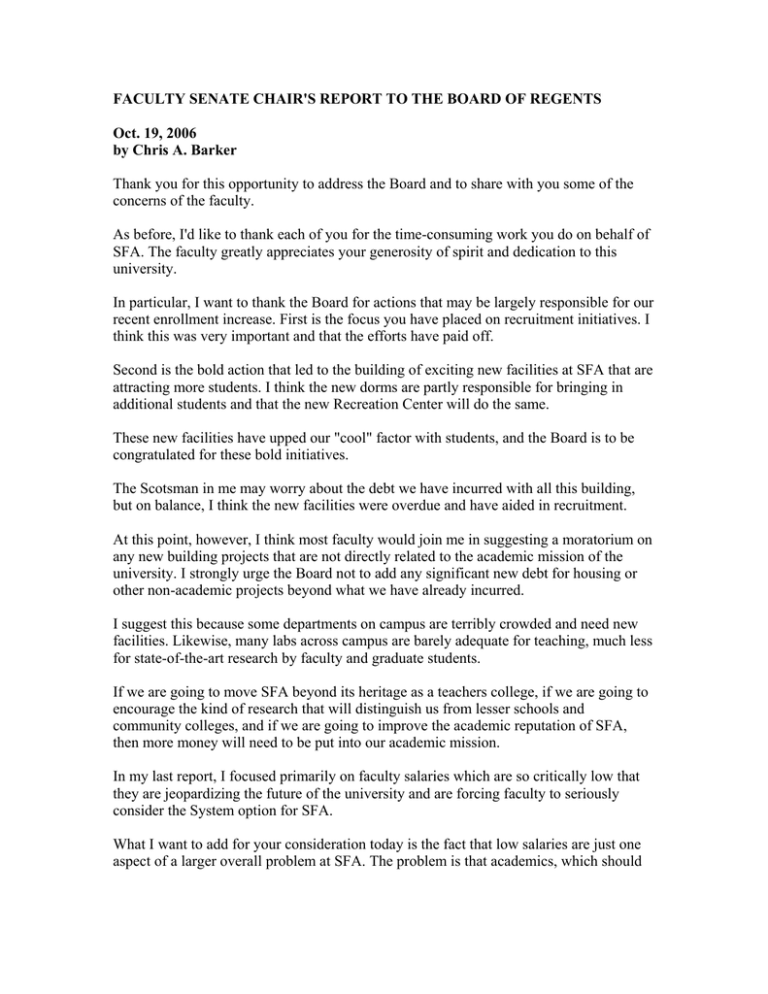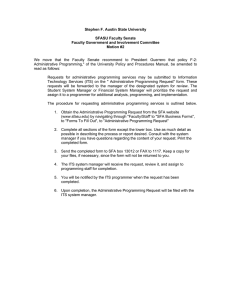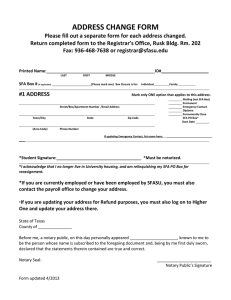FACULTY SENATE CHAIR'S REPORT TO THE BOARD OF REGENTS
advertisement

FACULTY SENATE CHAIR'S REPORT TO THE BOARD OF REGENTS Oct. 19, 2006 by Chris A. Barker Thank you for this opportunity to address the Board and to share with you some of the concerns of the faculty. As before, I'd like to thank each of you for the time-consuming work you do on behalf of SFA. The faculty greatly appreciates your generosity of spirit and dedication to this university. In particular, I want to thank the Board for actions that may be largely responsible for our recent enrollment increase. First is the focus you have placed on recruitment initiatives. I think this was very important and that the efforts have paid off. Second is the bold action that led to the building of exciting new facilities at SFA that are attracting more students. I think the new dorms are partly responsible for bringing in additional students and that the new Recreation Center will do the same. These new facilities have upped our "cool" factor with students, and the Board is to be congratulated for these bold initiatives. The Scotsman in me may worry about the debt we have incurred with all this building, but on balance, I think the new facilities were overdue and have aided in recruitment. At this point, however, I think most faculty would join me in suggesting a moratorium on any new building projects that are not directly related to the academic mission of the university. I strongly urge the Board not to add any significant new debt for housing or other non-academic projects beyond what we have already incurred. I suggest this because some departments on campus are terribly crowded and need new facilities. Likewise, many labs across campus are barely adequate for teaching, much less for state-of-the-art research by faculty and graduate students. If we are going to move SFA beyond its heritage as a teachers college, if we are going to encourage the kind of research that will distinguish us from lesser schools and community colleges, and if we are going to improve the academic reputation of SFA, then more money will need to be put into our academic mission. In my last report, I focused primarily on faculty salaries which are so critically low that they are jeopardizing the future of the university and are forcing faculty to seriously consider the System option for SFA. What I want to add for your consideration today is the fact that low salaries are just one aspect of a larger overall problem at SFA. The problem is that academics, which should be the highest funding priority at any university, seems to have been the lowest priority at SFA for years. Low funding for academics has created the following problems: • Almost every department on campus is understaffed. The result is that many faculty are required to teach significantly more than the suggested maximum load per semester. Heavy teaching loads cause burn-out and leave little time for research, and yet research is expected for tenure and promotion. Faculty want to conduct research -- it's part of why we went into academia. Our frustration stems from not having enough time to do it because of heavy teaching loads. (Bear in mind that "teaching" includes much more than just standing in front of a class. There is also preparation, review, grading, consultation, advising, committee service, and many other activities, all of which have to be attended to in addition to "teaching" and research.) A Faculty Senate committee has been charged with studying the faculty workload issue and will make recommendations. • Low funding for academics has a negative impact on our graduate programs. Our graduate stipends are still significantly lower that those offered at many other schools in Texas, which makes it difficult to attract top graduate students whose research would enhance the reputation of SFA and be top quality lab instructors. • Low funding also results in not having ENOUGH graduate students. This is a problem for academic departments and the university because: -- It limits how many students we can enroll in our freshman classes. Every semester in geology we have to limit the number of students in our introductory classes because we don't have enough graduate students to be able to add more lab sections. We could increase the size of our freshman lecture classes if we had more graduate students. -- There are not enough graduate students to teach upper-level labs, and thus tenured faculty have to teach these extremely time-consuming labs, which limits the time they have left to do research. -- Funding by the state is higher for graduate students than for undergraduates. Unfortunately, our graduate enroll went down this semester. It should be noted that our graduate program is also suffering because of the housing situation for married and international students. Most foreign graduate students have no transportation and are not allowed to have outside jobs to supplement their meager stipends. Thus, it is not a viable option for them to live in expensive dorms or apartments. They need subsidized housing on campus and should be together so they can form support networks. Married graduate students with children cannot live in dorms, so at present they are being forced into more expensive off-campus living, with the result that many are going deeper in debt with student loans. I urge the Board to address the needs of these students, so that our graduate program does not suffer further losses. • Low funding for academics has created a situation where some departments are severely crowded, and lack adequate labs. The chemistry building, for example, dates from the early history of SFA! Miller Science building, which houses biology, geology and physics, was built in 1968; thus its labs and classrooms are almost 40 years old. Outdated facilities make it very difficult for these departments to compete with other universities for faculty, graduate students and grants. • Low funding for academics has resulted in salaries that are far lower than those at equivalent universities. As one faculty member recently told me, this means that a faculty member here receives many thousands of dollars less over the span of a career -- and many more thousands less in one's retirement nest egg. Why would anyone want to stay here given that harsh reality? • Finally, low funding for academics has almost certainly led to SFA’s ranking in one of the widely read college guides, the U.S. News and World Report's annual issue on American colleges. You could call their ranking for SFA our "dirty little secret". We're listed as a third-tier university. That's one tier from the bottom. Their ranking system is based on several measures of academic quality, and our ranking in their guide probably results from years of misplaced funding priorities at SFA. That ranking, and its effect on our enrollment and quality of students, should be of grave concern to everyone in this room. Fortunately, SFA doesn't have to live with that kind of reputation. We can fix that and all the other problems I've mentioned simply by making academics the number one priority at SFA -- and sticking with that commitment until our academic house is in order. To do that, though, will require bold, decisive leadership from the Board. It will require a change in "business as usual" at SFA. I urge the Board to make academics the number one priority at SFA. In my last report I said that I felt SFA was at a turning point, that many faculty seemed ready to have SFA join a System because of the lack of funding for academics. I don't think that has changed, and that is why I urge the Board to consider bold action. If any Board members or administrators are interested in my ideas about ways in which large amounts of money could easily be freed up and applied to academics, I will be glad to address that topic. That concludes my report. I'll be glad to answer any questions you may have.





